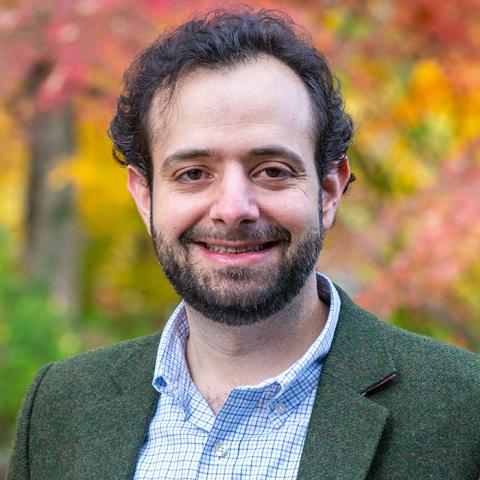Education
Analytic certificate: William Alanson White Institute
Ph.D.: Yeshiva University: Ferkauf Graduate School of Psychology
MPhil: Cambridge University
BA: Clark University
Biography
I am a clinical psychologist and psychoanalyst. I received my psychoanalytic training at the William Alanson White Institute in New York City and earned my Ph.D. in clinical psychology with a health emphasis from Yeshiva University: Ferkauf Graduate School of Psychology.
My approach to therapy is to work hard to create conditions for a safe, collaborative and non-judgmental space, where student-patients can feel heard and understood. I believe that the student-patient is the expert on their life and lived experience and so my job is to learn from them. This helps me to understand them and their experience, both with other people and with me as best as possible. Through active exploration, I hope to consider new ways of being and becoming and open up meaning making processes that may have for whatever reason been closed down.
Broadly speaking, I am interested studying the commonalities between contemporary interpersonal clinical practice and cultural psychology. I am particularly interested in how culture and cultural fields constitute the self and our field of experiencing. This leads me to explore and be interested in the ongoing meaning making processes between self and other as they are influenced by our social and interpersonal situations.
I am the editor of the recently published book Making Our Ideas Clear: Pragmatism and Psychoanalysis and the co-editor of the Journal of College Student Psychotherapy. Additionally, I have published in Culture & Psychology; Theory & Psychology; and Contemporary Psychoanalysis.
In addition to reading and writing, I enjoy cooking, pedaling on bikes that go nowhere, and spending time with my family.
Journal & Book Publications
- Philip J. Rosenbaum & Richard E. Webb (2019) Treating Trauma in the Fishbowl of University & College Counseling Centers, Journal of College Student Psychotherapy, DOI: 10.1080/87568225.2019.1671293
- Webb. R.E. & Rosenbaum, P.J. (2018) Resilience and thinking perpendicularly: A meditation or morning jog. Journal of College Student Psychotherapy, available online: https://www.tandfonline.com/doi/full/10.1080/87568225.2018.1449687
- Rosenbaum, P.J. (2018). Sociocultural Psychology & Interpersonal Psychoanalysis: The semiotic Space in the consulting room. In A. Rosa & J. Valsiner (Eds.) The Cambridge Handboook of Sociocultural Psychology (2nd Edition). Cambridge University Press, Cambridge UK.
- Webb, R. & Rosenbaum, P.J. (2018). The variety of procrastination: With different existential positions different reasons for it. Integrative Psychological and Behavioral Sciences, https://doi.org/10.1007/s12124-018-9467-1
- Rosenbaum, P.J. (2016). How self harmers use the body as an interpretive canvas. Culture & Psychology, 22 (1), 128-138.
- Rosenbaum, P.J. (2016) Roger Bibace: An interpersonal thinker. In J. Valsiner, M. Watzlawik & A. Kriebel (Eds.) Particulars and universals in clinical and developmental psychology: Critical reflections. Charlotte, NC: Information Age Publishing.
- Rosenbaum, P.J. & Liebert, H. (2015). Reframing the conversation on college student mental health. Journal of College Student Psychotherapy, 29 (3), 179-176.
- Rosenbaum, P.J. (Ed.) (2015). Making Our Ideas Clear: Pragmatism and Psychoanalysis. Charlotte, NC: Information Age Publishers.
- Rosenbaum, P.J. (2015). Harry Stack Sullivan and Charles Sanders Peirce: The impact of early pragmatism on interpersonal psychoanalysis. In P. Rosenbaum (Ed.) Making Our Ideas Clear: Pragmatism and Psychoanlaysis: Charlotte, NC: Information Age Publishers.
- Rosenbaum, P.J. (2013). Where is the place for loneliness? A commentary on “Loneliness: An integrative approach”. Journal of Integrated Social Sciences, 3(1), 30-36.
- Rosenbaum, P.J. (2013). The role of projective identification in constructing the “Other”: Why do Westerners want to “liberate” Muslim women? Culture & Psychology 19(2), 213-224. DOI:10.1177/1354067X12456719
- Rosenbaum, P.J. (2013). Returning to Modernity? A review of Conundrums: A Critique of Contemporary Psychoanalysis. Contemporary Psychoanalysis, 49(1), 113-124. ISBN: 0010-7530
- Rosenbaum, P.J. (2012). Blind spots and laziness: Two ways of becoming “stuck”. In S. Salvatore, A. Gennaro, J. Valsiner (Eds.) Making Sense of Infinite Uniqueness. Charlotte, NC: Information Age Publishing, 205-217.
- Rosenbaum, P.J. & Valsiner, J. (2011). The un-making of a method: From rating scales to the study of psychological processes. Theory and Psychology 21(1), 47-65.
- Rosenbaum, P.J. (2010). Deception in adolescent sexual conduct. Integrative Psychological and Behavioral Sciences, 44(4) 370-380.
- Wagoner, B. & Rosenbaum, P.J. (2009). From cellular to human worlds. In R.I. Sokol (Eds.) Relating to Environments: A New Look at Umwelt. Charlotte, NC: Information Age Publishing, (3-23).
- Rosenbaum, P.J. (2008). Regulation of the self in the therapeutic environment. A commentary on Morioka’s “Voices of the self”. International Journal for Dialogical Sciences, 3(1), 123-130. http://ijds.lemoyne.edu/journal/3_I/IJDS.3.1.09.Rosenbaum.html.
- Sokol, R.I.,& Rosenbaum, P.J. (2008). The dynamically changing organism through the lens of evolution and development. In R. Diriwachter, & J. Valsiner, (Eds.) Striving for the Whole: Creating Theoretical Syntheses. NJ: Transaction Publishers.
- Sokol. R.I. & Rosenbaum, P.J. (2004). Towards a holistic evolutionary psychology. From Past to Future, 5(1), 76-84.
Blog Posts and Other Writings
- How do you find a therapist who will understand you?
- Why talk to a therapist instead of a friend: The therapist-patient relationship
- Why we shouldn't fear failure: Sometimes success requires not getting it right the first time
Editorials for Journal of College Student Psychotherapy (with Ryan Weatherford and Danielle Oakley)
- Thoughts about the possibility of return: Exploring the potential new college life
- The following editorial has not been empirically verified
- Reflecting on our roles amidst national cultural tension and dialogue
- What does the EPPP Step 2 mean for college counseling
- Interpreting distress and expanding our introductions
- Models of a counseling center and the importance of context
- Knowing our boundaries
- Resilience in college students
- Context of suffering in violent times
